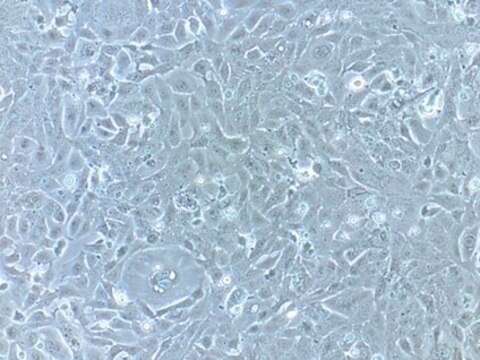L929/A
14112101, mouse adipose tissue, Fibroblast
Iniciar sesiónpara Ver la Fijación de precios por contrato y de la organización
About This Item
UNSPSC Code:
41106514
Productos recomendados
Nombre del producto
L929/A, 14112101, from mouse adipose tissue
biological source
mouse adipose tissue
description
Mouse C3H/An, connective tissue, Adriamycin,Doxorubicin, drug resistant
growth mode
Adherent
morphology
Fibroblast
technique(s)
cell culture | mammalian: suitable
shipped in
dry ice
storage temp.
−196°C
Cell Line Description
This Adriamycin-resistant cell line has been developed by exposure of the parent L929 murine fibroblast cell line (ECACC catalogue number 85011425) to increasing concentrations of doxorubicin in-vitro. L929/A cells can be used in the development of novel anti-cancer treatments. Resistance can be circumvented by modulating agents such as verapamil and quinine. The parent cell line L929 was derived from normal subcutaneous areolar adipose tissue.
Culture Medium
RPMI 1640 + 10% Fetal Bovine Serum (FBS) + 2mM L-Glutamine + 0.086 uM Doxorubicin hydrochloride.
Subculture Routine
Trypsinize with 0.05% Trypsin/EDTA and inoculate new cultures vessels at 1-2 x 104 cells/cm2. Cultures incubated in a humidified 5% CO2/95% air incubator at 37oC.
Other Notes
Additional freight & handling charges may be applicable for Asia-Pacific shipments. Please check with your local Customer Service representative for more information.
Cultures from PHE Culture Collections and supplied by Sigma are for research purposes only. Enquiries regarding the commercial use of a cell line are referred to the depositor of the cell line. Some cell lines have additional special release conditions such as the requirement for a material transfer agreement to be completed by the potential recipient prior to the supply of the cell line. Please view the Terms & Conditions of Supply for more information.
Elija entre una de las versiones más recientes:
Certificados de análisis (COA)
Lot/Batch Number
It looks like we've run into a problem, but you can still download Certificates of Analysis from our Documentos section.
Si necesita más asistencia, póngase en contacto con Atención al cliente
¿Ya tiene este producto?
Encuentre la documentación para los productos que ha comprado recientemente en la Biblioteca de documentos.
Nuestro equipo de científicos tiene experiencia en todas las áreas de investigación: Ciencias de la vida, Ciencia de los materiales, Síntesis química, Cromatografía, Analítica y muchas otras.
Póngase en contacto con el Servicio técnico
